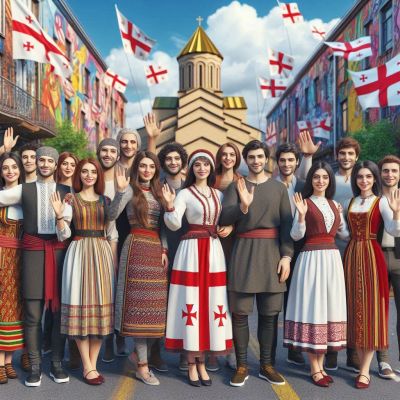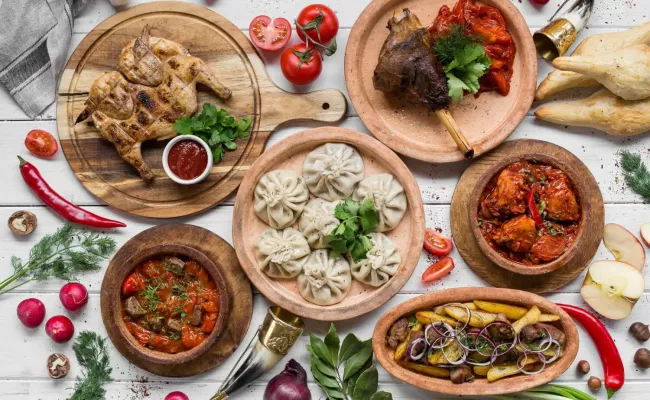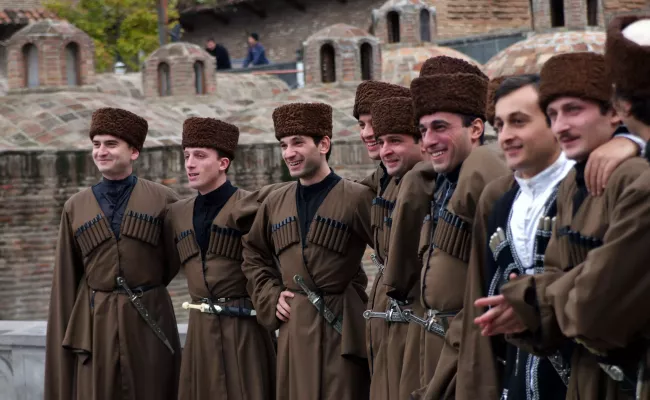Georgia’s culture has evolved over time, giving the country a distinct national identity and a strong literary legacy centered on the Georgian language and alphabet. Georgia’s strong sense of national identity has preserved its distinctness despite multiple periods of foreign rule.
Culture in Ancient and Old Georgia
Frescoes from the Svetitskhoveli Cathedral portray ships and monsters at sea, exemplifying Georgian medieval art.
King Parnavaz I of Iberia is believed to have reformed the Georgian alphabet in 284 BC, following its invention in the third century BC. According to most recent research, the earliest examples of the Georgian alphabet date to the fifth century AD.
Eastern Orthodox Christianity and the Georgian Orthodox and Apostolic Church had a significant impact on Georgian medieval culture, as they fostered and frequently financed the creation of numerous religious devotional works. These included buildings and monasteries, art pieces such as icons, and hagiographies of Georgian saints. They also wrote several secular books on national history, mythology, and hagiography.
Georgian People
Kartveli are the majority ethnic group in Georgia, which comprises almost all of the country’s 3,700,000 people. Other distinct ethno-linguistic groups discovered in Georgia are Svans (in the northwestern region of Svaneti) and Megrels (in the western region of Samegrelo). The Laz are another distinct ethnolinguistic community that predominantly lives in modern-day Turkey, with some scattered throughout the southwest provinces of Adjara and Samskhjavaxheti.

While each of these four ethnic groups speaks a distinct language, they are all members of the Kartvelian language family, which is unique among the world’s core language families. Isolated areas of the Greater Caucasus Mountains on the northern border speak other unique languages from the Northwest Caucasian and Northeast Caucasian language groups.
Adjaran, Gurian, Javakhetian, Imeretian, Rachan, Khevsurian, Tushi, Kartli, Shida Kartlian, Qvemo Karlian, and Kakhetian are some of the Georgian dialects spoken in their respective locations. The major cities of Tbilisi, Batumi, and Kutaisi all have dialects. The majority of Georgians can understand each other.
There are small but significant Georgian Diaspora communities in Moscow, Brooklyn, Washington, D.C., Paris, Greece, Turkey, Armenia, and Iran. The world’s total number of Georgians is approximately 4,000,000.
Ethnicity and regional diversity of Georgian people
Georgians are the ancestors of tribes that moved from Anatolia and settled in present-day Georgia. The Georgian ethnic nucleus is made up of three closely related tribes: Karts, Migrelo-Zans, and Svans. A distinct Georgian identity began to emerge in the first years of the first millennium BCE. The key causes influencing the construction of the Georgian ethnos were the strengthening of the Iberian state in the first and second centuries CE, the Georgians’ embrace of Christianity in the fourth and sixth centuries CE, and the development of the Georgian written language.
The ethnic Georgian formation was substantially accomplished between the sixth and tenth centuries. This period is distinguished by the strengthening and supremacy of the Georgian language, the construction of a sovereign territory, and appropriate cultural development.
Georgia Language
Georgian is the most widely spoken of the Kartvelian languages and is used as a literary language or lingua franca by speakers of related languages. It is Georgia’s official language and the native or primary language of 87.6% of the people. It has roughly four million speakers now. The official language of the Abkhazia Special Autonomous Region is Abkhaz, also known as Abkhazian, a Northwest Caucasian language.
Religion In Georgia
Georgia is an officially secular country that allows believers of all major global religions to practice their faith. Religion in Georgia reached a watershed moment in 326 AD, when the country is widely regarded as the second in the world (after Armenia) to have adopted Christianity. Today, around 80% of Georgia’s population identifies as Christian, with the majority subscribing to the Georgian Orthodox Church, the country’s most powerful and influential religious institution.
Islam has the second-highest number of followers in Georgia, particularly among Abkhazians and Georgians from Adjara and other southern districts. The majority of Azerbaijanis in the Kvemo Kartli Region, as well as the majority of Kists in Pankisi Gorge, identify as Muslims.
Assyrians, Armenians, Greeks, and Russians all have their own Orthodox churches in the country, along with a tiny number of Catholics. Georgia also has one of the world’s oldest Jewish diasporas, as well as smaller populations of Lutherans and Doukhobors, a pacifist Christian sect descended from Russia.
Cuisine Of Georgia
Georgian cuisine refers to the culinary techniques and cuisines developed by Georgians. Georgian cuisine is unique to the country, but it also draws on other Caucasian, Eastern European, and Middle Eastern culinary traditions. Each historical province of Georgia has its own distinct culinary culture, with variations including Abkhazian, Megrelian, Kakhetian, Imeretian, Svanetian, Pshavian, Tushian, Kartlian, Gurian, Meskhian, Rachian, and Adjarian cuisine. Georgian cuisine is rich in meat dishes, but it also offers a variety of vegetarian options.

Georgian cuisine is the result of a diverse range of culinary ideas brought along the Silk Road Trade route by merchants and tourists alike. The significance of food and drink in Georgian culture is best demonstrated during a feast known as supra, when a wide variety of dishes are prepared and always accompanied by copious amounts of local wine, which is known to be one of the world’s oldest wines, produced in ancient authentic Georgian underground kvevri clay pots (dating from the 8th century BC). The tamada (toastmaster) is highly respected in a Georgian feast.
